中职英语基础模块上册Unit 2
英语基础模块(上册)-第二单元Reading
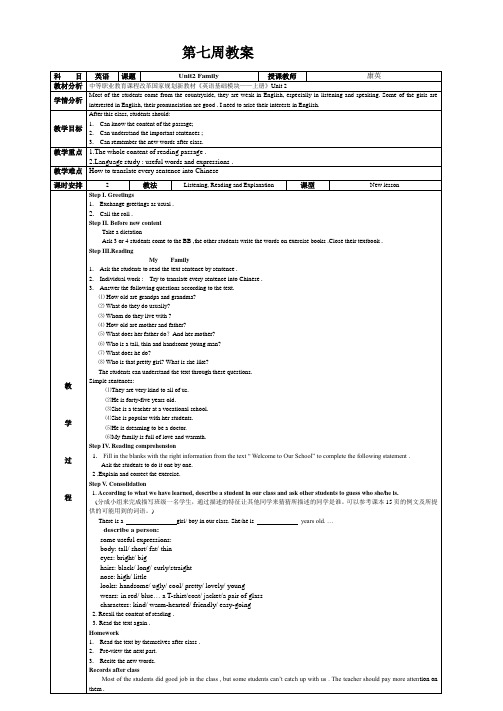
⑴They are very kind to all of us.
⑵He is forty-five years old.
⑶She is a teacher at a vocational school.
⑷She is popular with her students.
characters: kind/ warm-hearted/ friendly/ easy-going
2.Recall the content of reading .
3. Read the text again .
Homework
1.Read the text by themselves after class .
⑸He is dreaming to be a doctor.
⑹My family is full of love and warmth.
StepIV. Reading comprehension
1.Fill in the blanks with the right information from the text “ Welcome to Our School” to complete the following statement .
教学目标
After this class, students should:
1.Can know the content of the passage;
2.Can understand the important sentences ;
3.Can remember the new words after class.
StepIII.Reading
中职英语基础模块修订版(上)unit2

Reading and Writing
2 Discuss and tick. 小组讨论,你们是否赞同以下观点?
Idea
观点
Students should study hard. 学生应该努力学习。
Life is not all about study. Students need time to play. 学习不是生活的全部。学生需要时间玩耍。
Yes No
赞同 不赞同
√√ √√ √√ √√ √√
Reading and Writing
3 Read and learn. 读下文,了解艾丽斯的情况。
Alice is at a new school now. She misses her family and old friends very much. She tries her best to keep in touch with them. She phones her parents on weekends and writes to her grandparents every month. She also calls her old friends or chats with them online. Now she has many new classmates. She hopes she will make more friends at her new school.
我有一个幸福的家庭。
Warming up
2 Look and match. 看图,将表示人物性格的词与图片匹配。
sunny
cool
funny
Warming up
cool 冷静的,酷
Warming up
中职《英语 基础模块》上册 Unit 2 Family

are! I love you.
Language & Culture Press
Teaching Procedures
2. Reading
1. Lead in
2. Reading
Unit 42
3. Listening & Speaking
4. Summary 5. Homework
Language & Culture Press
1
Pre-reading activity
2
While-reading activity
3
Post-reading activity
1 Pre-reading activity
Activity 1
Who is she /he ?
She is a/an…
Father
Mother Uncle Aunt Grandpa
Activity 2 True or false:
1. My grandfather is over seventy.
4
5
4. Summary
5. Homework
Language & Culture Press
Teaching Procedures
1. Lead in
This is my… He / She is a …
Unit 42
Language & Culture Press
最新中职英语基础模块上册Unit-2

MY FAMILY
• Who?
grandfather and grandmother
• What ? retired workers
• How old? over seventy
• How? kind \help
MY FAMILY
• Who?
father
• What ? manager
• How old? forty-five years old
• How? hard working
MY FAMILY
• Who?
mother
• What ? teacher
• How old? forty-five years ld
• How? Lively/interesting/popular
MY FAMILY
• Who?
uncle
• What ? student
• ⑶live with 与…一起生活
• Eg:I live with my family.我与我的家人一起生活
• ⑷ together with连同.......
• Eg: I’ll go shoping together with my friends. 我和我的朋友一起去买东西
• My father stands behind my grandfather. He is forty‒ • five years old. He is a manager at a company and he • is a hardworking man. Behind my grandmother is my
pular with her students.
• ⑸also adv. 也,同样 • Eg:He also asked to go. 他还去问
中职英语基础模块一 Unit 2 Transportation(考点串讲+精练)
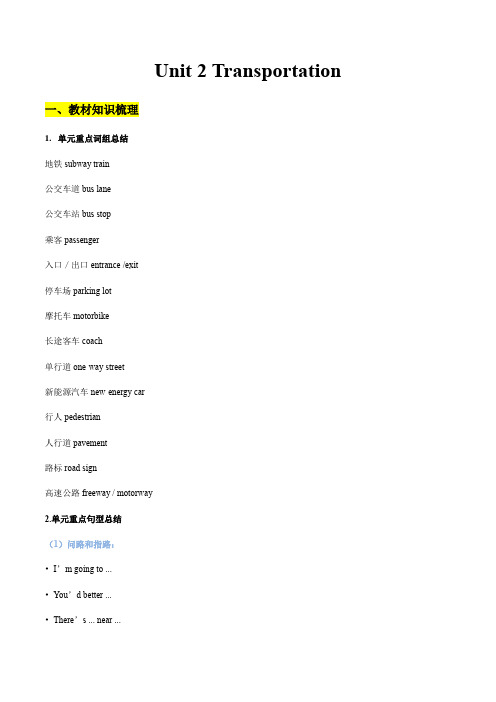
Unit 2 Transportation一、教材知识梳理1.单元重点词组总结地铁subway train公交车道bus lane公交车站bus stop乘客passenger入口/出口entrance /exit停车场parking lot摩托车motorbike长途客车coach单行道one-way street新能源汽车new-energy car行人pedestrian人行道pavement路标road sign高速公路freeway / motorway2.单元重点句型总结(1)问路和指路:•I’m going to ...•You’d better ...•There’s ... near ...•How long will it take by ... ?•Don’t worry about it.•It would be•Excuse me, could you tell me how to get to ... ? /Excuse me, how can I get to ... ?/ Excuse me, where is ... ?/Excuse me, is there a ... nearby?•I’m going to ...•You’d better ...•There’s ... near ...•How long will it take by ... ?3.单元语法总结祈使句的概念祈使句是用于表达命令、请求、劝告、警告、禁止等的句子。
祈使句因对象(主语)是第二人称,通常省略主语。
祈使句的时态都为一般现在时,句末可以用感叹号来表达比较强烈的语气,也可以用句点结尾。
命令:Go and wash your hands!去洗一下你的手!请求:Be quiet,please. 请安静。
劝告:Be kind to your friends.善待你的朋友。
警告:Watch your steps.注意台阶。
中职英语(语文出版社)基础模块上册Unit2Family教案(共5篇)

中职英语(语文出版社)基础模块上册Unit2Family教案(共5篇)第一篇:中职英语(语文出版社)基础模块上册 Unit2 Family 教案英语科公开课教案授课主题:Unit2 Family课堂类型:新授课课时安排:1课时授课人:学校:授课时间:教材分析1、在教学大纲中,学生要在本单元内容中要掌握基本的家庭成员,复习职业——教师的说法,并学习新知“经理”等;并掌握如何介绍和描述自己的家人。
2、本节内容,学生会学到基本的家庭成员在英语中的说法,在生活中用途广泛,并能体会到英语和汉语的细微差别。
3、本课通过综合阅读,侧重语言的读写功能,旨在培养学生的读写表达能力。
学情分析本班共有xx个学生,尖子生较少,中等的学生比较多,还有几个是基础相对薄弱的学生。
全班同学整体来说读书能力比较强,领悟能力较好,但是一些相似的单词容易混淆。
本节课的内容难度中等,尖子生学起来得心应手的同时,也在巩固与练习部分很好地照顾到了基础相对薄弱的学生。
教学目标词汇及短语:parents grandparents uncle manager be kind to …, enjoy doing …, be popular with …, on the right/left, and be full of… 句型:1、There are people in my family.They are my …and I.2、This is my.He/She is a.教学重难点重点:学习并掌握单词及短语。
难点:学习如何运用句型向别人描述或介绍自己的家庭。
教学课时安排 1课时教学过程师生问好,清点学生出勤情况并做记录。
班级:应到:人实到:人其他情况:一、Review & Warming up1、Review the greetings.T: Hello, boys and girls.How are you today? Ss: Fine, thank you.And you? T: I’m fine, too.Thank you.2、Introduce the teacher’s fam ily members in the picture to the students.3、Show the pictures of the members of a family and talk about them.Review the words(father,mother,brother,sister,farmer and more)and the sentence: 1)This is my mother/father/brother……2)He/She is a teacher/ doctor ……教师活动:1、教师把自己的家庭成员介绍给学生。
中职英语基础模块上册 unit 2 family 听力与课后练习

• 6.My mother always makes her classes lively and interestin.g
• and she is her students.
• 7.In the picture, my uncle standson the right of my father and a • pretty girl with long black hair stands on the left my mother.
• 6.The young manager is popular with all the workers
• in the company.
• 7.Don't stand there! Come and help me. • 8.I want to go shopping together with you. • 9.The handsome young boy in a red-shirtlooks
Listening
• 1. it is 2. the little girl 3. one year old • 4. she now 5. five years old 6.This is • 7. Glad to meet you 8. you are 9. love you
Reading Comprehension
• 4.My parents and I enjoy living together with my
• grandparents.
• 5.Both of my parents are forty-five years old. My father is a • manager at a company and my mother is a teacher at a • vocational school .
中职英语基础模块上册Unit-2

Match the words in Box A with the words in Box B.
A
• Grandmoth er
• Grandfathe r
• Father • Mother • uncle
B
• teacher • retired worker • manager • student
3)指示代词: 指示说明近处或者远处、上文或 者下文、以前或者现在的人或事物。
• 指示代词既可以单独使用做句子的主语、宾语或表语,也可以 作定语修饰名词。
• 如:
• What’s this?(这是什么?) • That model plane is made of plastic.(那只模型飞机是塑料做的) • (被动句) • Remember never to do such things.(记得永远不要做这样的事情
• ⑹ be popular with 受…的欢迎
• Eg:This singer is popular with young people.
•
这个歌手很受年轻人的欢迎
• On the right of my father stands a handsome Young ma n, tall and thin. He wears a blue T‒shirt and looks rathe r cool. He is my uncle. He is a student at a
中职英语高教版 基础模块1U2 Transportation

仿照句子,进行对话
Ella Baker: Excuse me, could you tell me how to get to Teaching Building 2? Zhang Yuchen: Sure. Go along this road and turn right at Teaching Building 1. Then, turn left at the first turning. You will see Teaching Building 2 on your right.
Байду номын сангаас
subway train n. 地铁
bus lane n.公交专用道
词汇学习
shared bike n.共享单车
bus stop n.公交站
passenger n.乘客
词汇学习
go along 直走
turn left 向左转
turn right 向右转
词汇学习
turning 转向
crossroads 十字路口
将出行词汇与图中要素相匹配
3 subway train
6
bus lane
1 shared bike
2 bus stop
4 passenger
5 entraanttcaceh/eedxit
观看视频,找出询问地方的句子。
Excuse me, could you tell me how to get to......?
Unit 2 Transportation
1.明确交通的有关信息 2.询问并给予方向指导 3.交换有关交通的计划 4.为顾客写下交通计划 5.学习更多有关绿色交通的重要性
词汇学习
中职英语基础模块(上册)unit.pdf

Unit 2 Family(Ⅰ)Teaching aims(教学目的及要求):了解有关家庭成员以及有关职业的词汇掌握询问家庭及职业的句型,练习提高英语口语交际能力 识记本单元的词汇Teaching importance and difficulties(教学重点及难点):询问家庭及职业的句型,提高英语口语交际能力 熟练认读本单元英语词汇Class(课时):1课时Teaching methods(教学方法):情景教学法、合作教学法、分组教学法运用情景教学和分组教学的方法使学生积极参与课堂中有关“家庭及职业”的提问——How many people are there in your family ? who are they? What are they?等, 以及根据实际情况回答“There are people in my family. They are my . ……;当同学回答遇到困难的时候,可以求助同学和老师,在老师同学的帮助下完成提问,提高同学回答问题的积极性。
Teaching aids (教具):准备有关家庭成员的图片;录音机Reference book (参考书):教师用书Teaching procedures(教学过程): Step1——warming up:Describe the members of a family in the picture.we can draw the family tree.Family treenurse/policeman/ engineer …There are They are My isa ;…… Divide into groups to make oral practice with above useful expressions . Step 2——new words and expressions⑴be kind to …“对…和蔼可亲”be friendly to …“对…友好”eg:Our teacher is very kind/friendly to us.⑵enjoy doing …喜爱做…Eg: I enjoy listening to music.enjoy oneself 玩的高兴,过的愉快Eg:Are you enjoying yourself?⑶live with 与…一起生活Eg:I live with my family.⑷ together withEg: I’ll go shoping together with my friends.⑸also adv. 也,同样Eg:He also asked to go.He has made up his mind to go to the countryside, and I also.与too 的区别Eg: I was there and he was there too.还有 as well/either:Eg: I like you as well.I don’t like him either.总结also 用于肯定句的句中too/as well 用于肯定句句尾either 用于否定句句末⑹ be popular with 受…的欢迎Eg:This singer is popular with young people.⑺ on the right/left ofEg: I sit on the right/left of him.⑻be full ofEg: our class is full of love and warmth.Her eyes are full of tears.Step 3——Read the new words and expressions over times folling the tapes.Homework :(分层次作业)1、To remember the new words and expressions.2、To preview the “Family”,complete the Reading Comprehension onpage 12 in textbook.Blackboard design:( 板书设计)Unit 2 Family1、Family treeJobs :Useful expressions:How many people are there in your famiy?There are .Who are they ?They are .What are they?My father is a ;my mother is a ; my brother isa ;……2、new words and expressions⑴be kind to …“对…和蔼可亲”be friendly to …“对…友好”⑵enjoy doing …喜爱做…enjoy oneself 玩的高兴,过的愉快⑶live with 与…一起生活⑷ together with⑸also adv. 也,同样与too 的区别还有 as well/either:总结also 用于肯定句的句中too/as well 用于肯定句句尾either 用于否定句句末⑹ be popular with 受…的欢迎⑺ on the right/left of⑻be full ofTeaching reflection:(教学后记)1、要求每个同学都能按照板书上的交际用语根据实际情况回答问题,提高同学的口语交际能力。
中职英语基础模块(上)unit2第二课时

S2: S1: S2: S1: S2: S1:
He’s sunny and What’s he/she like? She’svery very cool and afriendly. little crazy. Do you often play together? He’s/she’s very xxx. Do you often play together?
Unit 2 It’s easy to make friends! 交朋友很容易!
Period 2
Warming-up What is he/she like? (他/她是个什么样的人?)
smart 聪明的
cool 酷
What is he/she like? (他/她是个什么样的人?)
friendly 友好的
sunny 快活的,乐观的
What is he/she like? (他/她是个什么样的人?)
helpful 乐于助人的
kind 亲切的
What is he/she like? (他/她是个什么样的人?)
naughty 调皮的 funny 有趣的
Pay attention! 请注意!
• What does he like? • 他喜欢(做)什么?
h o s f c o o
e t h r r n y
l r k i a a e
p s i e z u b
f u n n y g t
u n d d l h c
l n h l y t k
s k r e i y b
l
t
s
r
h
o
i
高教版中职英语(基础模块-第1册)Unit-2《I-can-do-it》ppt课件1全

□ family
□ parents
Activity 13
Read and circle. 阅读求职表,圈出申请表中包含 的要素。
name
phone number
age ability
e-
mail address
Unit task
application 2CCCCCC) CCCCCCCCCCCNow complete your application form in 2015. form
b. Name Sally Smith Age 25
Address No. 4 Hexi Street, Tianjin
Position applied Sales Manager
Abilities I can use the computer. I can drive a car. I can write in English and French. …
Choose and guess. 各自选出下面的一种职业,通过与同伴 问答猜出对方的职业。
eg Group members: Can you …? You: Yes, … / No, …
( ) ask for personal information.
( ) fill in an application form. ( ) use “can”. ( ) talk about abilities.
I you Yes, he / she / it can. we you they
I
you
he / she / it
Can
we
…?
you
they
I
you
No,
中职英语基础模块1 unit2

中职英语基础模块1 unit2Unit 2: Greetings and IntroductionsVocabulary:1. Greetings - words or actions used to say hello or welcome someone.2. Introductions - the act of making someone known to others.3. Formal - following established conventions or rules.4. Informal - relaxed and casual.5. Polite - having or showing good manners or respect for others.6. Respectful - showing admiration or deference towards someone.7. Handshake - a formal way of greeting someone by clasping their hand and shaking it.8. Bow - a gesture of respect or reverence made by bending the body forward from the waist.9. Hug - to hold someone tightly in one's arms, typically to express affection.10. Kiss - to touch or press one's lips against someone or something as a greeting or to show affection.Phrases:1. How are you? - a common greeting used to ask about someone's well-being.2. Nice to meet you - a polite phrase used to express pleasure in meeting someone for the first time.3. What's your name? - a question used to ask someone's name.4. My name is... - a phrase used to introduce oneself by stating their name.5. Where are you from? - a question used to ask someone's place of origin.6. I'm from... - a phrase used to state one's place of origin.7. How old are you? - a question used to ask someone's age.8. I'm... years old - a phrase used to state one's age.9. Goodbye - a common farewell used to say goodbye to someone.10. See you later - a casual phrase used to say goodbye with the intention of seeing the person again.Sentences:1. Hello, how are you?2. Nice to meet you, my name is John.3. Where are you from?4. I'm from China.5. How old are you?6. I'm 18 years old.7. Goodbye, have a nice day!8. See you later, take care!Dialogues:Dialogue 1:A: Hello, how are you?B: I'm good, thank you. How about you?A: I'm great, thanks for asking. Nice to meet you, my name is Lisa. B: Nice to meet you too, Lisa. I'm Mike.Dialogue 2:A: Where are you from, Mike?B: I'm from the United States. How about you, Lisa?A: I'm from China.B: That's interesting. How old are you?A: I'm 20 years old. And you?B: I'm 22. Goodbye, it was nice talking to you.A: Goodbye, see you later!Note: The above dialogues are just examples and can be modified or expanded upon based on the context and individuals involved.。
外研版中职国规英语教材基础模块第一册第2单元
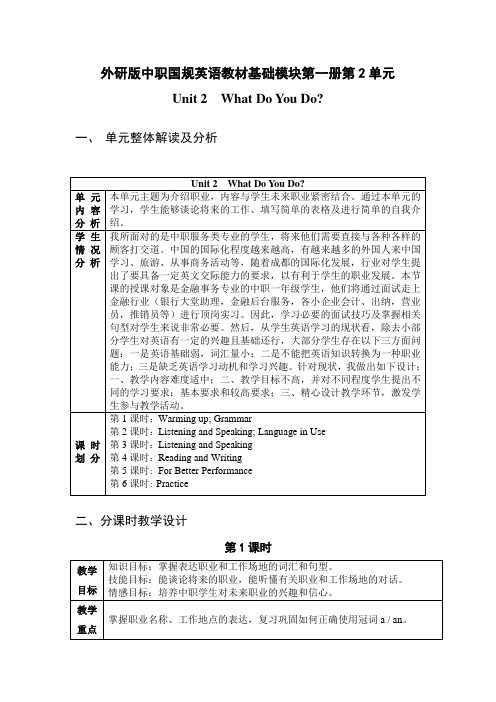
外研版中职国规英语教材基础模块第一册第2单元
Unit 2 What Do You Do?
一、单元整体解读及分析
二、分课时教学设计
第1课时
第2课时
第3课时
第4课时
第5课时
第6课
作者简介:许莉婷,1983年6月出生,中共党员,于2006年通过成都市企事业单位公开招聘,加入了成都市礼仪职业中学,成为一名光荣的人民教师。
本人自入校以来,工作已有五年时间,主要担任校英语教学工作,班主任以及全国英语等级考试三、四级口语口试考官工作。
在此期间多次作为教师代表参加各级各类教育教学研讨活动并做示范课展示,论文曾获中国教育学会第21次全国学术年会二等奖,并在四川省教科所论文评选及成都市教科室论文评选中荣获奖项;曾荣获全国“高教”杯中职英语教师创新说课比赛二等奖及最佳新人奖,成都市武侯区高中英语教师比赛一等奖,成都市武侯区教坛新秀,成都市武侯区优秀共产党员等荣誉称号。
中职英语基础模块上册unit-2.
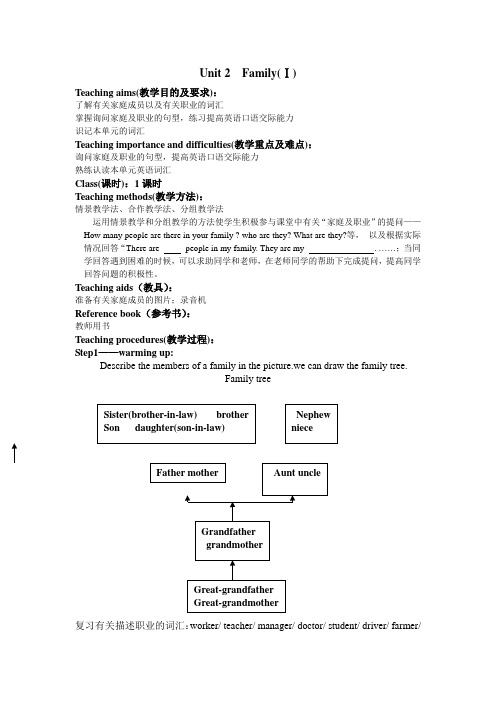
Unit 2 Family(Ⅰ)Teaching aims(教学目的及要求):了解有关家庭成员以及有关职业的词汇掌握询问家庭及职业的句型,练习提高英语口语交际能力识记本单元的词汇Teaching importance and difficulties(教学重点及难点):询问家庭及职业的句型,提高英语口语交际能力熟练认读本单元英语词汇Class(课时):1课时Teaching methods(教学方法):情景教学法、合作教学法、分组教学法运用情景教学和分组教学的方法使学生积极参与课堂中有关“家庭及职业”的提问——How many people are there in your family ? who are they? What are they?等,以及根据实际情况回答“There are people in my family. They are my . ……;当同学回答遇到困难的时候,可以求助同学和老师,在老师同学的帮助下完成提问,提高同学回答问题的积极性。
Teaching aids(教具):准备有关家庭成员的图片;录音机Reference book(参考书):教师用书Teaching procedures(教学过程):Step1——warming up:Describe the members of a family in the picture.we can draw the family tree.Family tree复习有关描述职业的词汇:worker/ teacher/ manager/ doctor/ student/ driver/ farmer/nurse/policeman/ engineer…练习询问有关家庭及家庭成员职业的简单句:How many people are there in your famiy?There are .Who are they ?They are .What are they?My father is a ;my mother is a ; my brother isa ;……Divide into groups to make oral practice with above useful expressions .Step 2——new words and expressions⑴be kind to …“对…和蔼可亲”be friendly to …“对…友好”eg:Our teacher is very kind/friendly to us.⑵enjoy doing …喜爱做…Eg: I enjoy listening to music.enjoy oneself 玩的高兴,过的愉快Eg:Are you enjoying yourself?⑶live with 与…一起生活Eg:I live with my family.⑷ together withEg: I’ll go shoping together with my friends.⑸also adv. 也,同样Eg:He also asked to go.He has made up his mind to go to the countryside, and I also.与too 的区别Eg: I was there and he was there too.还有 as well/either:Eg: I like you as well.I don’t like him either.总结also 用于肯定句的句中too/as well 用于肯定句句尾either 用于否定句句末⑹ be popular with 受…的欢迎Eg:This singer is popular with young people.⑺ on the right/left ofEg: I sit on the right/left of him.⑻be full ofEg: our class is full of love and warmth.Her eyes are full of tears.Step 3——Read the new words and expressions over times folling the tapes.Homework :(分层次作业)1、To remember the new words and expressions.2、To preview the “Family”,complete the Reading Comprehension onpage 12 in textbook.Blackboard design:( 板书设计)Unit 2 Family1、Family treeJobs :Useful expressions:How many people are there in your famiy?There are .Who are they ?They are .What are they?My father is a ;my mother is a ; my brother isa ;……2、new words and expressions⑴be kind to …“对…和蔼可亲”be friendly to …“对…友好”⑵enjoy doing …喜爱做…enjoy oneself 玩的高兴,过的愉快⑶live with 与…一起生活⑷ together with⑸also adv. 也,同样与too 的区别还有 as well/either:总结also 用于肯定句的句中too/as well 用于肯定句句尾either 用于否定句句末⑹ be popular with 受…的欢迎⑺ on the right/left of⑻be full ofTeaching reflection:(教学后记)1、要求每个同学都能按照板书上的交际用语根据实际情况回答问题,提高同学的口语交际能力。
中职英语基础模块上册unit 2

Unit 2 Family(Ⅰ)Teaching aims(教学目的及要求):了解有关家庭成员以及有关职业的词汇掌握询问家庭及职业的句型,练习提高英语口语交际能力识记本单元的词汇Teaching importance and difficulties(教学重点及难点):询问家庭及职业的句型,提高英语口语交际能力熟练认读本单元英语词汇Class(课时):1课时Teaching methods(教学方法):情景教学法、合作教学法、分组教学法运用情景教学和分组教学的方法使学生积极参与课堂中有关“家庭及职业”的提问——How many people are there in your family ? who are they? What are they?等,以及根据实际情况回答“There are people in my family. They are my . ……;当同学回答遇到困难的时候,可以求助同学和老师,在老师同学的帮助下完成提问,提高同学回答问题的积极性。
Teaching aids(教具):准备有关家庭成员的图片;录音机Reference book(参考书):教师用书Teaching procedures(教学过程):Step1——warming up:Describe the members of a family in the picture.we can draw the family tree.Family treeSister(brother-in-law) brother Son daughter(son-in-law) NephewnieceFather motherAunt uncleGrandfathergrandmotherGreat-grandfatherGreat-grandmother复习有关描述职业的词汇:worker/ teacher/ manager/ doctor/ student/ driver/ farmer/ nurse/policeman/ engineer…练习询问有关家庭及家庭成员职业的简单句:How many people are there in your famiy?There are .Who are they ?They are .What are they?My father is a ;my mother is a ; my brother is a ;…… Divide into groups to make oral practice with above useful expressions . Step 2——new words and expressions⑴be kind to …“对…和蔼可亲”be friendly to …“对…友好”eg: Our teacher is very kind/friendly to us.⑵enjoy doing …喜爱做…Eg: I enjoy listening to music.enjoy oneself 玩的高兴,过的愉快Eg:Are you enjoying yourself?⑶live with 与…一起生活Eg:I live with my family.⑷ together withEg: I’ll go shoping together with my friends.⑸also adv. 也,同样Eg:He also asked to go.He has made up his mind to go to the countryside, and I also.与too 的区别Eg: I was there and he was there too.还有 as well/either:Eg: I like you as well.I don’t like him either.总结also 用于肯定句的句中too/as well 用于肯定句句尾either 用于否定句句末⑹ be popular with 受…的欢迎Eg:This singer is popular with young people.⑺ on the right/left ofEg: I sit on the right/left of him.⑻be full ofEg: our class is full of love and warmth.Her eyes are full of tears.Step 3——Read the new words and expressions over times folling the tapes.Homework :(分层次作业)1、 To remember the new words and expressions.2、 To preview the “Family”,complete the ReadingComprehension on page 12 in textbook.Blackboard design:( 板书设计)Unit 2 Family1、Family treeSister(brother-in-law) brother Son daughter(son-in-law)NephewnieceFather motherAunt uncleGrandfathergrandmotherGreat-grandfatherGreat-grandmotherJobs :Useful expressions:How many people are there in your famiy?There are .Who are they ?They are .What are they?My father is a ;my mother is a ; my brother is a ;……2、new words and expressions⑴be kind to …“对…和蔼可亲”be friendly to …“对…友好”⑵enjoy doing …喜爱做…enjoy oneself 玩的高兴,过的愉快⑶live with 与…一起生活⑷ together with⑸also adv. 也,同样与too 的区别还有 as well/either:总结also 用于肯定句的句中too/as well 用于肯定句句尾either 用于否定句句末⑹ be popular with 受…的欢迎⑺ on the right/left of⑻be full ofTeaching reflection:(教学后记)1、要求每个同学都能按照板书上的交际用语根据实际情况回答问题,提高同学的口语交际能力。
中职英语基础模块上册unit2.doc

Unit 2 Family(Ⅰ)牛平Teaching aims教(学目的及要求):了解有关家庭成员以及有关职业的词汇掌握询问家庭及职业的句型,练习提高英语口语交际能力识记本单元的词汇Teaching importance and difficulties教( 学重点及难点):询问家庭及职业的句型,提高英语口语交际能力熟练认读本单元英语词汇Class(课时):1课时Teaching methods教( 学方法):情景教学法、合作教学法、分组教学法运用情景教学和分组教学的方法使学生积极参与课堂中有关“家庭及职业”的提问——How many people are there in your family ? who are they? What are they? 等,以及根据实际情况回答“There are people in my family. They are my . ⋯⋯;当同学回答遇到困难的时候,可以求助同学和老师,在老师同学的帮助下完成提问,提高同学回答问题的积极性。
Teaching aids(教具):准备有关家庭成员的图片;录音机Reference book(参考书):教师用书Teaching procedures教( 学过程):Step1——warming up:Describe the members of a family in the picture.we can draw the family tree.Family treeSister(brother-in-law) brother NephewSon daughter(son-in-law) nieceFather mother Aunt uncleGrandfathergrandmotherGreat-grandfatherGreat-grandmother复习有关描述职业的词汇:worker/ teacher/ manager/ doctor/ student/ driver/ farmer/nurse/policeman/ enginee⋯r练习询问有关家庭及家庭成员职业的简单句:How many people are there in your famiy?There are .Who are they ?They are .What are they?My father is a ;my mother is a ; my brother isa ;⋯⋯Divide into groups to make oral practice with above useful expressions . Step 2——new words and expressions⑴be kind to ⋯“对⋯和蔼可亲”be friendly to ⋯“对⋯友好”eg:Our teacher is very kind/friendly to us.⑵enjoy doing ⋯喜爱做⋯Eg: I enjoy listening to music.enjoy oneself 玩的高兴,过的愉快Eg :Are you enjoying yourself?⑶live with 与⋯一起生活Eg:I live with my family. ⑷together withEg: I ’ll go shoping together with my friends.⑸also adv. 也,同样Eg:He also asked to go.He has made up his mind to go to the countryside, and I also. 与too 的区别Eg:I was there and he was there too.还有as well/either:Eg: I like you as well.I don ’t like him either.总结a lso 用于肯定句的句中too/as well 用于肯定句句尾either 用于否定句句末⑹be popular with 受⋯的欢迎Eg:This singer is popular with young people.⑺on the right/left ofEg: I sit on the right/left of him.⑻be full ofEg: our class is full of love and warmth.Her eyes are full of tears.Step 3 ——Read the new words and expressions over times folling thetapes.Homework :(分层次作业)1、To remember thenew words and expressions.2、To preview the “Family ”,complete the Reading Comprehension onpage 12 in textbook.Blackboard design:(板书设计)Unit 2 Family 1、Family treeSister(brother-in-law) brother NephewSon daughter(son-in-law) nieceFather mother Aunt uncleGrandfathergrandmotherGreat-grandfatherGreat-grandmotherJobs :Useful expressions:How many people are there in your famiy?There are .Who are they ?They are .What are they?My father is a ;my mother is a ; my brother isa ;⋯⋯2、new words and expressions⑴be kind to ⋯“对⋯和蔼可亲”be friendly to ⋯“对⋯友好”⑵enjoy doing ⋯喜爱做⋯enjoy oneself 玩的高兴,过的愉快⑶live with 与⋯一起生活⑷together with⑸also adv. 也,同样与too 的区别还有as well/either:总结a lso 用于肯定句的句中too/as well 用于肯定句句尾either 用于否定句句末⑹be popular with 受⋯的欢迎⑺on the right/left of⑻be full ofTeaching reflection:(教学后记)1、要求每个同学都能按照板书上的交际用语根据实际情况回答问题,提高同学的口语交际能力。
中职英语基础模块上册 unit 2 family课文翻译和知识点
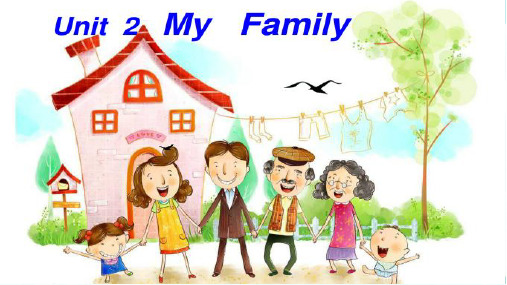
⑻ be full of 充满.......
• Eg: our class is full of love and warmth.
•
我们班充满了爱和温暖
•
Her eyes are full of tears.
•
她的眼睛充满了泪水
1. Look at this picture, this is a picture of my family. 看这张照片,这是一张我家人的照片。 2. In the picture, you can see an old man and an old woman. They are my grandfather and grandmother. They are over seventh and both of them are retired worker. 在这张照片里,你可以看见一位老先生和一位老太太。他们
• •How many people are there in your family?
• ----There are
people in my family.
• •Who are they? • ----They are my
and I.
reading
• look at the picture. This is a picture of my family.
• ⑹ be popular with 受…的欢迎
• Eg:This singer is popular with young people.
•
这个歌手很受年轻人的欢迎
MY FAMILY
• Who?
mother
• What ? teacher
• How old? forty-five years old
- 1、下载文档前请自行甄别文档内容的完整性,平台不提供额外的编辑、内容补充、找答案等附加服务。
- 2、"仅部分预览"的文档,不可在线预览部分如存在完整性等问题,可反馈申请退款(可完整预览的文档不适用该条件!)。
- 3、如文档侵犯您的权益,请联系客服反馈,我们会尽快为您处理(人工客服工作时间:9:00-18:30)。
名 mine Yours his hers its ours yours theirs 词 性
• 1)形容词性物主代词只能作句子中名词的修饰语,后面要跟名词。 • 如:Is that your umbrella?(那是你的伞吗?) • I often go to see my aunt on Sundays.(我经常在星期天去看望阿姨) • They are their books.(是他们的书) • 2)名词性物主代词相当于名词,既代替事物又表明所属关系,在句子中 往往独立地作主语、宾语或者表语,后面千万不可以跟名词。 • 如:This is your cup, but where is mine? • (这是你的杯子,可我的在哪儿?mine=my cup) • Your classroom is very big, but ours is rather small. • (你们的教室很大,我们的相当小.ours=our classroom)
y are over seventh and both of them are retired worker.
They are very kind to all of us .They always help us do a l ot of housework. My parents and I enjoy living together with my grandparents. We all love • them very much.
• left of my mother. Who is she? Can you guess?
⑺ on the right/left of 在.........的右边/左边 Eg: I sit on the right/left of him. 我坐在他的左/右边
• This is my happy family. My family is full of love an d warmth.
• ⑹ be popular with 受…的欢迎 • Eg:This singer is popular with young people. • 这个歌手很受年轻人的欢迎
• On the right of my father stands a handsome Young ma
n, tall and thin. He wears a blue T‒shirt and looks rathe r cool. He is my uncle. He is a student at a • medical college now. He is dreaming to be a doctor. Lo ok, a pretty girl with long black hair stands on the
单数
this(这个) that(那个)
复数
含义
these(这些) 指较近的人和物 those(那些) 指较远的人和物
such (这样的人/物)
same (同样的人/物) it (这人/这物)
指上文提过的人和物
指和上文提过的相同的人和物 指不太清楚是谁或者是什么时
• 指示代词既可以单独使用做句子的主语、宾语或表语,也可以 作定语修饰名词。 • 如: • What’s this?(这是什么?) • That model plane is made of plastic.(那只模型飞机是塑料做的) • (被动句) • Remember never to do such things.(记得永远不要做这样的事 情) Do the same as the teacher tells you. (按老师说的做) • ---Who is it?(是谁?) • ---It’s me!(是我!)
• 3、“of + 名词性物主代词”称为双重所有格,作定语 时放在名词的后面。 • 如:A friend of mine came to see me yesterday. • (我的一个朋友昨天来看我了) • (指若干朋友中有一个来看我。)
3)指示代词: 指示说明近处或者远处、上文或 者下文、以前或者现在的人或事物。
• ⑶live with 与…一起生活
• Eg:I live with my family.我与我的家人一起生活
• ⑷ together with连同.......
• Eg: I’ll go shoping together with my friends. 我和我的朋友一起去买东西
• My father stands behind my grandfather. He is forty‒
• five years old. He is a manager at a company and he
• is a hardworking man. Behind my grandmother is my
mother. She is also forty‒five but she looks young • for her age. She is a teacher at a vocational school. • Her classes are always lively and interesting. She is pop ular with her students.
• ⑴be kind to …“对…和蔼可亲” / be friendly to …“对…友好” • Eg:Our teacher is very kind/friendly to us.
• •
我们的老师对我们非常和蔼可亲
• ⑵enjoy doing …喜爱做…
Eg: I enjoy listening to music. 我喜欢听音乐
Grandmother 奶奶
Grandfather 爷爷
parents 父母/爸爸妈妈
Grandparents 爷爷奶奶
Sister 姐姐/妹妹
Brother 哥哥/弟弟
Family 家人/家庭
reading
• look at the picture. This is a picture of my family.
第三人称单数
第一 第二人 男性 女性 人 称 称单数 单数 中性 第一 第二 第三人 人称 人称 称复数 复数 复数
主 I
宾 me
you
he
she
her
it
it
we
us
you
you
they
them
you ( him 你)
• (1)主格用来作句子的主语、表语。 • 如:I often go shopping on Sundays(主语) • Where have they gone?(主语) • That’s it.(表语) • It’s him!(表语) • (2)宾格用来作及物动词或者介词的宾语。如: • Who teaches you English this year?(宾语?) • Help me!(宾语!) • We often write letters to her.(宾语)
• It took him three days to clean his house.(打扫屋子花了他三天的时间
)
2、物主代词:说明事物所属关系的代词, 分为形容词性和名词性两种。
第一 第三人称单数 第一 第二 第二人 第三人称复 人 称 人称 人称 称单数 男性 女性 中性 数 单数 复 数 复数
• (4)人称代词it除了可以指人指物之外,还可以表示“时间、天气
、温度、距离、情况”等含义,此外还可以作“非人称代词”使用,
替代作主语或者宾语的不定式、动名词或者名词性从句。 • 如:--What’s the weather like today?(今天天气怎样?) • —It’s fine.(天气晴好) • It’s a long way to go.(那可要走好长的路)
• ⑸also adv. 也,同样 • Eg:He also asked to go. 他还去问
• 与too 的区别 • Eg: I was there and he was there too. 我也在那里,他在那里 • 还有 as well/either: • Eg: I like you as well. 我喜欢你 • I don’t like him either. 我不喜欢他
Match the words in Box A with the words in Box B.
A B
• Grandmoth er • Grandfathe r • Father • Mother • uncle
• teacher
• retired worker • manager • student
• • • • • •
(3) 三个不同人称同时出现,或者主语中包含“我”时,按照 “you→he→I”的顺序表达。 如:Both he and I are working at that computer company. (我和他都在那家电脑公司上班) ——Who will go there?(谁要去那儿?) ——You and me.(你和我)
• (4)疑问代词:用来提出问题的代词称为疑问代词 。 • who、whom、whose、what、which、whoever、 whatever、whichever主要用于特殊疑问句中,一般放 在句首。 • 口语中也常用who代替whom作宾语,但在介词后则只 能用whom。 • Eg: who is she? • What do you want? • Whom are you waiting for?
•
• • • • • •
Reading Comprehension 1.There are six people in “my family”.
